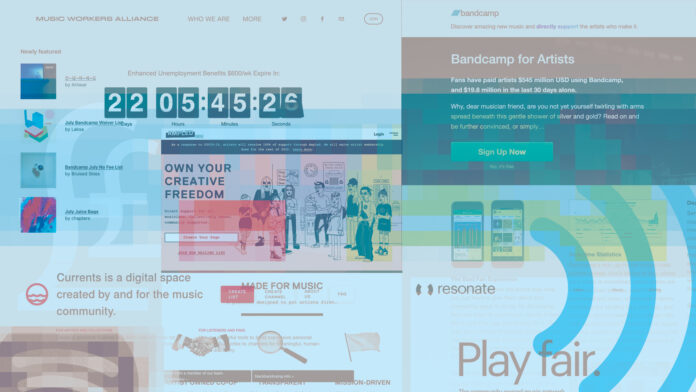As dance music’s top-heavy, tour-focused infrastructure crumbles, people across the industry are wondering how new revenue streams can emerge to support artists during and after the pandemic. DJ Mag looks at different projects that are taking bold steps to reimagine how dance music can work for everyone.
DJ Mag, by Chal Ravens, Aug 18, 2020.
Pay For Play
The steady success of Bandcamp has proved that fans are still willing to spend money on music, particularly on ‘fee-waiver’ days when artists earn an additional 15% on sales. Other attempts at an artist-friendly alternative to streaming, including the Berlin-based co-operative platform Resonate, have struggled to square up to giants like Spotify and YouTube.
Fans are already using Bandcamp-adjacent tools like Buy Music Club, where DJs can create shoppable playlists, and Currents FM, where fans subscribe to artist channels offering playlists and exclusive uploads.
Live Streams
…imagine a network of paid-access online spaces hosting music, videos, writing, live streams and conversations — a “supportnet”, to borrow from a phrase from the critic Mat Dryhurst, where subscription fees go directly to creators instead of disappearing into a black box of measly royalties.
The supportnet could include services like ERIS, a subscription-based video streaming service set to launch at the end of summer. We’re used to watching live streams, but we’re not used to paying for them — that needs to change, believes ERIS co-founder and electronic music PR Melissa Taylor. “You can have 100,000 followers on YouTube, but if none of them will part with money for your art they actually have no value to you,” she says. “You can’t pay the rent with likes, and I don’t want to live in a world where only rich people can make art.”
The point, besides putting money in the pockets of creators, is to reject the “hustle” mindset that puts independent artists in competition with each other and instead to embrace collective action.
Patreon Of The Arts
From temporary fundraisers to long-term support mechanisms, there are multiple possible nodes in the supportnet. A grassroots system is an opportunity to “fight back against the whims of advertisers or non-philanthropy,” points out music writer David Turner, who casts a critical eye over the business of streaming in his newsletter Penny Fractions.
“Patreon, which I use for my newsletter, is a venture-capital backed firm that has repeatedly made decisions that were counterproductive towards its community. Any supportnet platform ought to be accountable to its workers, but also the users of the platform. Ideally there would be dialogue between those who make the platform, its creators, and those who supply money.”
Turner’s vision of accountability and shared decision-making is already being tested out. In 2018, a group of artists and workers in New York City founded Ampled, a music platform run as a co-operative. Ampled works similarly to Patreon, with artists posting content to a community of subscribers who pay a flat fee of $3 a month (or more, if they can). The aim is to provide artists with a regular, predictable income while letting them retain control of their work. Operations are directed by everyone involved — artists, fans and company workers — with each group taking three seats on the board of directors.
Co-founder Austin Robey sees Ampled as a retort to the kind of investor-backed platforms designed to create value for shareholders rather than creators.
Rethinking Ownership
These online tools offer new opportunities for underground music, but the scenes they support wouldn’t exist without IRL spaces, relationships and communities. With touring on hold for the foreseeable future, could we see a renewed focus on local scenes, with neighbours forming closer alliances?
Selwa Abd, AKA DJ and producer Bergsonist, is a co-founder of Pick Up The Flow, an online community where New York musicians can promote shows, swap gear and share information within “a sort of independent bubble ecosystem”. “Being part of the group gives me the drive to pursue more social work and think of new ways of using my social skills to connect people and channel resources, especially since the BLM protests and Covid-19,” says Abd.
Abd is excited by the prospect of a supportnet “in which big companies are obliged to fund musicians. We need more opportunities directly distributed to individual artists.” If music companies, festivals and magazines have profited from musicians’ work, she says, they should be giving something back.
A More Radical Landscape
Nothing is more urgent than “unionising at every level,” according to Carin Abdula, the founder of Outer Agency, whose roster includes Huerco S and Machine Woman. “I’ve been shouting about this for years. It feels nice to be able to say it without feeling like a crazy tinfoil hat person,” she laughs. “When push comes to shove, the only way we’re getting things done is by collaborating with each other to put pressure on governments and at the local level. I’ve seen it happen between festivals, promoters and venues — people are communicating with each other more than ever, so to me that only spells unionising.”
Analysis:
This piece gave me a comprehensive overview of solutions for “gig economy” artists missing out on revenue during COVID-19. While the Short North Arts District is known for its galleries, it also has a handful of nightlife venues and a theater, meaning DJs, drag queens, music artists, actors, and other performers are left with digital platforms as the only way to share their work. A theme from this article that struck me was the idea of a sort of “paid subscription” for fans of local artists.




